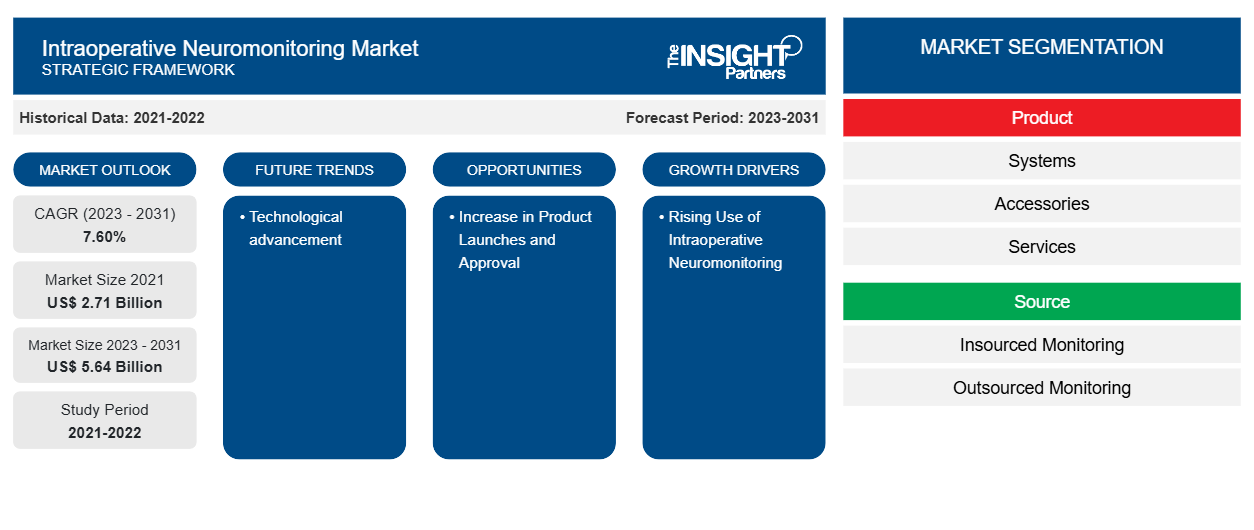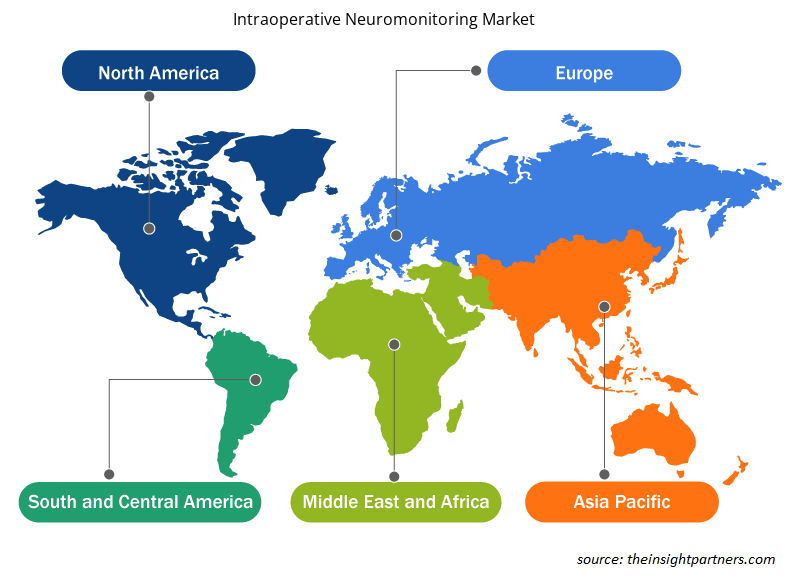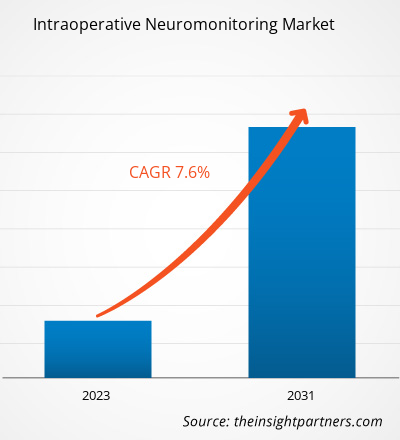The intraoperative neuromonitoring market was valued at US$ 2.71 billion in 2021 and is expected to reach US$ 5.64 billion by 2031. The market is expected to register a CAGR of 7.60% in 2023–2031. Technological advancement will likely remain key intraoperative neuromonitoring market trends.
Intraoperative Neuromonitoring Market Analysis
Intraoperative neuromonitoring (IONM) drivers are the healthcare providers in charge of performing and interpreting neuromonitoring during surgical procedures. These individuals are usually highly trained neurophysiologists or technicians who use various monitoring techniques to assess the nervous system's functional integrity in real-time. Continuous technological development was improving the capabilities of IONM systems, allowing for more accurate and real-time monitoring during surgical procedures. The use of IONM was growing as surgeons and other medical professionals. In addition to improving patient safety, IONM reduces the risk of nerve damage by aiding in real-time nervous system monitoring during surgeries. To improve outcomes and reduce postoperative issues, surgeons use IONM to identify and treat potential surgical complications, such as nerve compression or damage. The need for IONM services to enhance patient safety during complicated procedures is growing as more surgeries are carried out. More surgeries lead to greater use of IONM, especially those involving delicate neural structures. To summarize, the increase in medical procedures impacts interoperative neuromonitoring, driving progress, growing the labor force, and highlighting the significance of integrating neuromonitoring into routine surgical procedures.
Intraoperative Neuromonitoring Market Overview
IONM, one of the fastest-growing subfields in neurology, uses electrophysiological technology to identify nervous structures that require protection during neurosurgical procedures and to see what is happening throughout the body. In general, recordings of electrical potentials flowing through the nervous system during surgery are used to monitor and map electrical signals in the body through neurologist-led IONM. IONM uses various techniques, each selected for highly particular uses. Moreover, several modalities may be used in the same surgery, depending on the selected procedure. Electroencephalography (EEG), somatosensory evoked potentials (SSEPs), visual evoked potentials (VEPs), brainstem auditory evoked potentials (BAEPs), motor evoked potentials (MEPs), electromyography, and other techniques may be used. Patients undergoing a wide range of central nervous system surgeries, such as interventional radiologic procedures, orthopedic spinal correction, epilepsy surgery, and craniofacial neurosurgery, can benefit from these techniques. Although it can be applied to other fields like vascular and endocrine surgery, it is most frequently used with spinal, epilepsy, brain tumors, and cerebrovascular surgery.
Customize This Report To Suit Your Requirement
You will get customization on any report - free of charge - including parts of this report, or country-level analysis, Excel Data pack, as well as avail great offers and discounts for start-ups & universities
Intraoperative Neuromonitoring Market: Strategic Insights

- Get Top Key Market Trends of this report.This FREE sample will include data analysis, ranging from market trends to estimates and forecasts.
You will get customization on any report - free of charge - including parts of this report, or country-level analysis, Excel Data pack, as well as avail great offers and discounts for start-ups & universities
Intraoperative Neuromonitoring Market: Strategic Insights

- Get Top Key Market Trends of this report.This FREE sample will include data analysis, ranging from market trends to estimates and forecasts.
Intraoperative Neuromonitoring Market Drivers and Opportunities
Rising Use of Intraoperative Neuromonitoring to Favor Market
Ion Mapping and Microsurgery (IONM) enhances patient safety by helping surgeons avoid damage to critical brain structures and reduce the risk of complications during procedures by providing them with real-time feedback. During procedures, especially those involving proximity to vital nerves, surgeons can achieve precise navigation by employing IONM to monitor the functional integrity of the nervous system. IONM helps in the early detection of potential issues by lowering the risk of complications like nerve damage, paralysis, or sensory loss both during and after surgery. The combination of these factors underscores the importance of intraoperative neuromonitoring in modern surgical settings, advancing its adoption as standard practice in many procedures.
Increase in Product Launches and Approval – An Opportunity in Intraoperative Neuromonitoring Market
Due to rising global demand from a sizable population, the healthcare sector is constantly expanding, increasing new product development, launches, and approvals. Major market players also invest in research and development to promise innovation and create effective products. For instance, in October 2023, a revolutionary feature of the Neuromaster G1 intraoperative neuromonitoring (IONM) system is the One View solution, introduced by Nihon Kohden, a leading global manufacturer of medical electronic equipment. This novel approach enables the IONM software to seamlessly integrate neurological data with the patient's vital signs, such as heart rate, SpO2, temperature, and more, while maintaining the patient's anesthesia.
Intraoperative Neuromonitoring Market Report Segmentation Analysis
Key segments contributing to the intraoperative neuromonitoring market analysis derivation are product, source, application, modality, and end user.
- Based on product, the intraoperative neuromonitoring market is divided into systems, accessories, services. The systems segment held a larger market share in 2023.
- By source, the market is segmented into insourced monitoring, outsourced monitoring.
- In terms of application, the market is divided into spinal surgery, neurosurgery, vascular surgery, ENT surgery, orthopedic surgery, and other surgeries.
- By modality, the market is segmented into motor evoked potentials, somatosensory evoked potentials, electroencephalography, electromyography, brainstem auditory evoked potentials, visual evoked potentials.
- Based on end user, the intraoperative neuromonitoring market is categorized into hospitals, ambulatory surgical centers.
Intraoperative Neuromonitoring Market Share Analysis by Geography
The intraoperative neuromonitoring market report's geographic scope is divided into five regions: North America, Asia Pacific, Europe, Middle East & Africa, and South America/South & Central America.
North America has dominated the intraoperative neuromonitoring market. In North America, the U.S. is the largest market for intraoperative neuromonitoring in 2023. Moreover, Asia Pacific is anticipated to grow with the highest CAGR in the coming years. IONM was becoming increasingly popular in Asia-Pacific due to rising awareness, advancements in technology, and an increase in surgical procedures. The growing demand for cutting-edge healthcare solutions and an understanding of the advantages of neuromonitoring during surgical procedures drive the growth of the Asia-Pacific IONM market. Major hospitals and healthcare facilities in the Asia-Pacific area have adopted IONM as a standard procedure for complex surgeries to improve patient safety. IONM is widely used in orthopedic and spine surgeries in the Asia-Pacific region, where there is a significant need to monitor neural structures during these procedures.
Intraoperative Neuromonitoring Market Regional Insights
The regional trends and factors influencing the Intraoperative Neuromonitoring Market throughout the forecast period have been thoroughly explained by the analysts at The Insight Partners. This section also discusses Intraoperative Neuromonitoring Market segments and geography across North America, Europe, Asia Pacific, Middle East and Africa, and South and Central America.

- Get the Regional Specific Data for Intraoperative Neuromonitoring Market
Intraoperative Neuromonitoring Market Report Scope
| Report Attribute | Details |
|---|---|
| Market size in 2021 | US$ 2.71 Billion |
| Market Size by 2031 | US$ 5.64 Billion |
| Global CAGR (2023 - 2031) | 7.60% |
| Historical Data | 2021-2022 |
| Forecast period | 2023-2031 |
| Segments Covered |
By Product
|
| Regions and Countries Covered | North America
|
| Market leaders and key company profiles |
Intraoperative Neuromonitoring Market Players Density: Understanding Its Impact on Business Dynamics
The Intraoperative Neuromonitoring Market is growing rapidly, driven by increasing end-user demand due to factors such as evolving consumer preferences, technological advancements, and greater awareness of the product's benefits. As demand rises, businesses are expanding their offerings, innovating to meet consumer needs, and capitalizing on emerging trends, which further fuels market growth.
Market players density refers to the distribution of firms or companies operating within a particular market or industry. It indicates how many competitors (market players) are present in a given market space relative to its size or total market value.
Major Companies operating in the Intraoperative Neuromonitoring Market are:
- Medtronic
- Neurosoft
- Nihon Kohden Corporation
- IntraNerve Neuroscience Holdings, LLC
- NuVasive, Inc.
- Neurovision Medical Products
Disclaimer: The companies listed above are not ranked in any particular order.

- Get the Intraoperative Neuromonitoring Market top key players overview
Intraoperative Neuromonitoring Market News and Recent Developments
The intraoperative neuromonitoring market is evaluated by gathering qualitative and quantitative data post primary and secondary research, which includes important corporate publications, association data, and databases. The following is a list of developments in the market for Intraoperative Neuromonitoring and strategies:
- MPOWERHealth, a pioneer in the field of intraoperative neuromonitoring (IONM), announced the strategic acquisition of Assure Neuromonitoring's operations in pivotal markets, marking a significant step in expanding its best-in-class intraoperative neuromonitoring (IONM) services. The targeted acquisition boosts MPOWERHealth's patient coverage to over 55,000 annually, solidifying its role as a leader in advancing surgical safety and patient outcomes (Source: MPOWERHealth Company Name, Newsletter, 2024)
- Brainlab, a digital medical technology company, announced the acquisition of Dr. Langer Medical GmbH. Based in Waldkrich, Germany, the family-owned company specializes in the development of intraoperative neuromonitoring solutions and related equipment for surgical interventions. (Source: Brainlab AG Company Name, Press Release, 2022)
Intraoperative Neuromonitoring Market Report Coverage and Deliverables
The “Intraoperative Neuromonitoring Market Size and Forecast (2021–2031)” report provides a detailed analysis of the market covering below areas:
- Market size and forecast at global, regional, and country levels for all the key market segments covered under the scope
- Market dynamics such as drivers, restraints, and key opportunities
- Key future trends
- Detailed PEST/Porter’s Five Forces and SWOT analysis
- Global and regional market analysis covering key market trends, major players, regulations, and recent market developments
- Industry landscape and competition analysis covering market concentration, heat map analysis, prominent players, and recent developments
- Detailed company profiles
- Historical Analysis (2 Years), Base Year, Forecast (7 Years) with CAGR
- PEST and SWOT Analysis
- Market Size Value / Volume - Global, Regional, Country
- Industry and Competitive Landscape
- Excel Dataset
Testimonials
Reason to Buy
- Informed Decision-Making
- Understanding Market Dynamics
- Competitive Analysis
- Identifying Emerging Markets
- Customer Insights
- Market Forecasts
- Risk Mitigation
- Boosting Operational Efficiency
- Strategic Planning
- Investment Justification
- Tracking Industry Innovations
- Aligning with Regulatory Trends
Yes! We provide a free sample of the report, which includes Report Scope (Table of Contents), report structure, and selected insights to help you assess the value of the full report. Please click on the "Download Sample" button or contact us to receive your copy.
Absolutely — analyst assistance is part of the package. You can connect with our analyst post-purchase to clarify report insights, methodology or discuss how the findings apply to your business needs.
Once your order is successfully placed, you will receive a confirmation email along with your invoice.
• For published reports: You’ll receive access to the report within 4–6 working hours via a secured email sent to your email.
• For upcoming reports: Your order will be recorded as a pre-booking. Our team will share the estimated release date and keep you informed of any updates. As soon as the report is published, it will be delivered to your registered email.
We offer customization options to align the report with your specific objectives. Whether you need deeper insights into a particular region, industry segment, competitor analysis, or data cut, our research team can tailor the report accordingly. Please share your requirements with us, and we’ll be happy to provide a customized proposal or scope.
The report is available in either PDF format or as an Excel dataset, depending on the license you choose.
The PDF version provides the full analysis and visuals in a ready-to-read format. The Excel dataset includes all underlying data tables for easy manipulation and further analysis.
Please review the license options at checkout or contact us to confirm which formats are included with your purchase.
Our payment process is fully secure and PCI-DSS compliant.
We use trusted and encrypted payment gateways to ensure that all transactions are protected with industry-standard SSL encryption. Your payment details are never stored on our servers and are handled securely by certified third-party processors.
You can make your purchase with confidence, knowing your personal and financial information is safe with us.
Yes, we do offer special pricing for bulk purchases.
If you're interested in purchasing multiple reports, we’re happy to provide a customized bundle offer or volume-based discount tailored to your needs. Please contact our sales team with the list of reports you’re considering, and we’ll share a personalized quote.
Yes, absolutely.
Our team is available to help you make an informed decision. Whether you have questions about the report’s scope, methodology, customization options, or which license suits you best, we’re here to assist. Please reach out to us at sales@theinsightpartners.com, and one of our representatives will get in touch promptly.
Yes, a billing invoice will be automatically generated and sent to your registered email upon successful completion of your purchase.
If you need the invoice in a specific format or require additional details (such as company name, GST, or VAT information), feel free to contact us, and we’ll be happy to assist.
Yes, certainly.
If you encounter any difficulties accessing or receiving your report, our support team is ready to assist you. Simply reach out to us via email or live chat with your order information, and we’ll ensure the issue is resolved quickly so you can access your report without interruption.





















 Get Free Sample For
Get Free Sample For